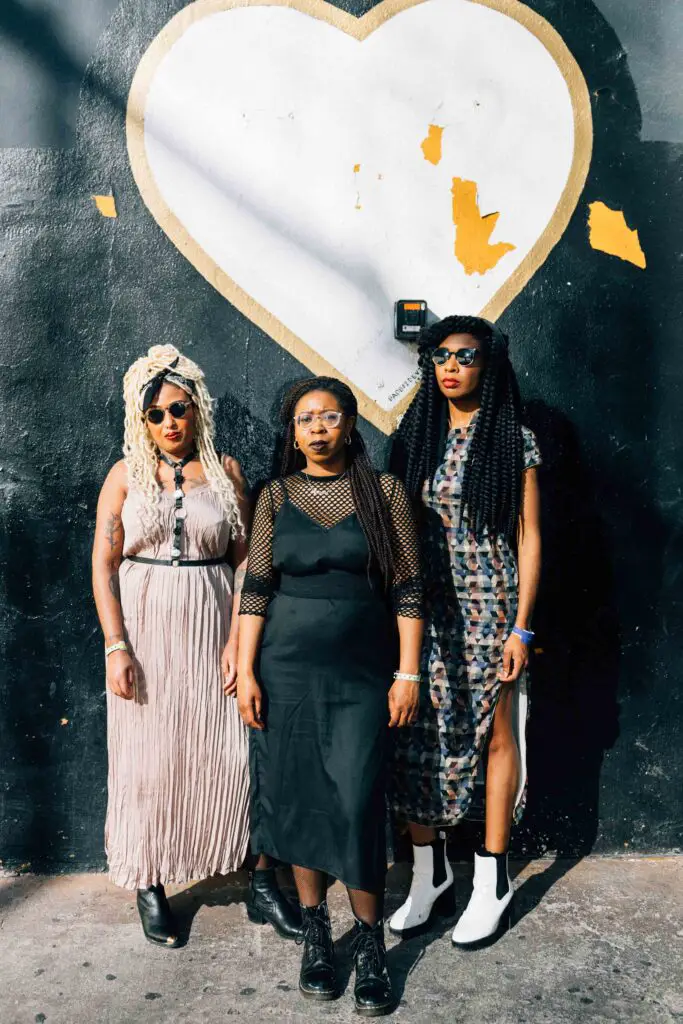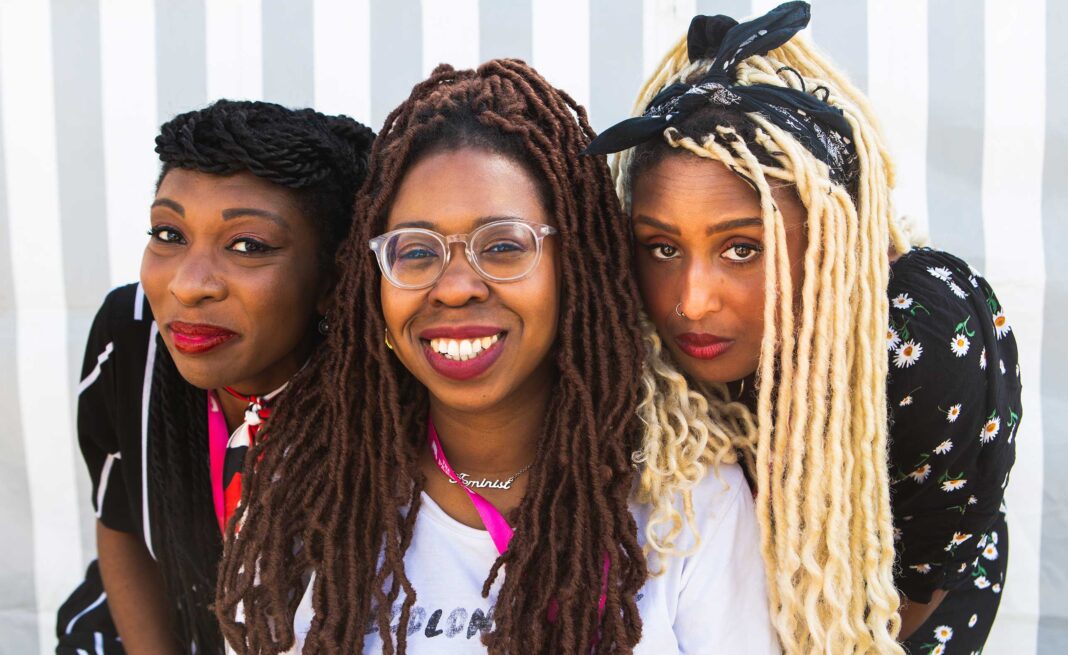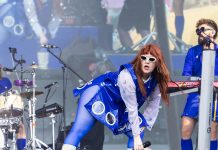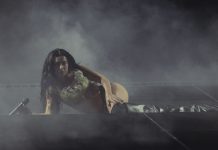As Big Joanie make their first-ever visit to Worthy Farm, playing their second set of the weekend up on the panoramic Park Stage, a perfect storm of events collide and jolt awake the hungover masses who have made it up the hill. Shortly after the band’s drummer Chardine Taylor-Stone has crowned the deserving winner of an impromptu dance competition, a ferocious gust of wind whips up last night’s fallen confetti into a swirling blizzard, and as petals soar across the pit, bassist Estella Adeyeri looks momentarily stunned. It’s one of those magical, serendipitous moments that nothing can prepare you for.
Spawned from London’s DIY scene in the early twenty-tens, Big Joanie were originally founded when Chardine Taylor-Stone spotted Stephanie Phillips’ Raincoats tote bag – and the rest is history. Setting out to carve out their own space in a scene dominated by white musicians, Big Joanie frequently return to the idea of a ‘Crooked Room’ – an analogy painted by the author and academic Melissa Harris-Perry. “When they confront race and gender stereotypes, Black women are standing in a crooked room, and they have to figure out which way is up,” Harris-Perry writes in her book Sister Citizen: Shame, Stereotypes and Black Women in America.
One of the band’s earlier singles from 2016 borrows its name from this image, and broods with uneasy, anxious dissonance. Two years later, 2018’s spare, sharp-angled debut album ‘Sistahs’ explored marginalisation, fractured relationships and being tokenized as a Black women with the kind of precise, powerful punk-rock that recalls some of their musical heroes: Sonic Youth, Sleater-Kinney and Skunk Anansie to name three. It’s a deeply impressive record which simmers with rage, hope and potential.
Now gearing up for their unannounced second album, Big Joanie air a good chunk of the record for today’s lucky punters – and their fearsome new single ‘Happier Still’ gives an early indication of things to come. Fresh from playing Grace Jones’ Meltdown festival as they arrive in Pilton for the first time, we catch up with the trio backstage after their magical Sunday lunchtime set on the Park Stage.
How is your first Glastonbury going?
Stephanie Phillips: It’s so nice to see the vastness of it, we’ve been enjoying ourselves.
Chardine Taylor-Stone: We’ve played a lot of festivals before, but this feels very different. Glastonbury’s so iconic – Gossip have played Park Stage! That’s the thing that makes it different from anything else.
Estella Adeyeri: We got taken to Block 9 and the IICON stage with the big head, and the Unfairground. That was a bit weird with all the doll heads… We saw Megan Thee Stallion, Jesus and Mary Chain, and Billie Eilish, too.
C: It’s good to see acts that probably cost the same amount as the ticket to see at a stadium.
How did you find your set? You had a lot of hungover truckers who were probably down at Block 9 last night watching, and they seemed to really get into it.
C: Our audience is quite varied, and I guess if people like the bands we grew up listening to, they can hear that in our sound – but we also have our own Big Joanie sound. We’d like to see more diversity in the scenes that we hang in, though. But when we play, people do come and see us. We always get some Black girl dragging her boyfriend to the front, which is always really sweet, or people who might not have heard of us as well, and have just come across us. Anyone actively coming to see us is on the right side anyway, because you’re making the right choice to come and see a Black feminist punk band.
E: It was really amazing seeing all the petals [on the floor] blowing in the wind, and seeing people’s reactions to us really made us happy. Love a bit of confetti drama mid-set.
And then right before Glastonbury, you were on the bill for Meltdown at the Southbank Centre, curated by the iconic Grace Jones…
E: We were so lucky to be invited by Grace Jones, and to get to play in that kind of room. We hadn’t played for our own audience for a while – we’d been doing festivals – and playing in a room full of our own audience in London really solidified what we’re doing as a band, and what we’ve accomplished. It was nice to be able to create the space that we’re always talking about when Steph introduces ‘Crooked Room’ – a space where everyone feels comfortable and their access needs are being met, everyone’s being respectful but still enjoying themselves. It felt really special. And then for the rest of the week we got to see all of these icons from when we were kids: Skunk Anansie, Grace Jones. It’s wild to be on a bill with both of those artists.
Estella, I know you’re involved in Girls Rock London outside of the band – a group which works to empower young women and trans and/or non-binary people to make music. The organisation talks about the importance of creating a more diverse music industry that then inspires the next generation. Growing up, were there any particular bands you remember relating to, who inspired you to become musicians? Or did you have to forge your own path?
C: I didn’t see anything and I still did it anyway. It’s important… like, we saw Megan Thee Stallion yesterday and it was really amazing to see a Black woman with a full figure just being like, fuck you, this is my body. That was really empowering. But I also think as women, our imaginations are unlimited, and I don’t think we should be waiting for anybody to be there for us to think that we can do something. Men don’t: they think they’re everybody and everything. They probably think they’re us [laughs]. It’s important to have that representation on stage and in the industry but I also think as creative beings, we can be influenced by anything. A lot of my influences musically are bands with blokes in, to be honest.
E: I did have one direct influence because I got to see my sister playing in bands when she was at Uni – she was a big role model. Seeing Skunk Anansie on Top of The Pops was huge, and I remember watching Shingai [Shoniwa] in the Noisettes back in the day. That definitely helped as well, but I think you’re right [Chardine], we did end up having to carve out our own spaces. The line-up at this festival [Glastonbury] is very diverse but that doesn’t mean that the crew and backstage staff is. There have been so many strides made in lighting and sound, but they can seem very opaque in terms of how you get into it, and that’s something we’re working on as a band. We get people to shadow us so they can get the experiences that men just give to their mates. We always try to think beyond the three of us.

Yes, you mentioned during the show this morning that your sound person has been a joy to work with. But I imagine that’s not always the case…
E: That’s why we got our own sound person!
C: Feminism is about empowering yourself and representation, but also it’s about being able to ask for what you want. Men do that all the time, these man-bands have this and that because they’ve gone into a room and said ‘this is what we need’. As female-born people sometimes we can be socialised to stay quiet and it’s then about having to reteach yourself, especially as a queer person. You’re taught by society to be small and in the corner, and in the music industry even more so. Not to be all girl-boss, but we are bosses – it is our band.
The backdrop to Glastonbury feels very frightening – Roe Vs. Wade has just been overturned in the US, and here in the UK we’re facing a cost of living crisis, a surge in discrimination against the trans community, and events like the train strikes – which you referenced on stage – tell a deeper story about the state of workers rights. Is there anything that gives you hope that good is going to prevail?
C: I mean, the strikes – and seeing other people stand up for themselves. There was a statistic doing the rounds saying that searches for ‘join a union’ went up 184% on Google. What we’re seeing is a backlash to the last six or seven years with things like Black Lives Matter, trans activism, feminism, and that always happens. There’s always a push forward – we had it in the ‘80s and ‘90s as well. It’s up to us to continue doing the work we’re doing. Over here what’s often forgotten is that women in Northern Ireland still need to travel over to England, Scotland and Wales to access abortion services, and that’s some work we can be doing here. Let’s get more radical. Society is moving forward whether these people are connected to the establishment like it or not.
Looking ahead, you’re on the upcoming ‘Dig Me Out’ Sleater-Kinney covers album, alongside the likes of Courtney Barnett, St Vincent, and Self Esteem. What song have you covered?
S: We’ve done ‘Things You Say’. Sleater-Kinney are definitely one of my favourite bands, I listened to them all the time as a teenager: it was very emotional.
E: They were very influential in terms of guitar styles as well
S: Yeah! I tried to copy Corin [Tucker’s] guitar style and combine it with Carrie’s to create a more jazzy sound for myself. I wouldn’t be playing guitar without Sleater-Kinney. It’s so weird that we’ve met them.
E: Corin offered around this cheese plate which I thought was very nice. They wrote a song about that night on their latest album! It was one of the last big ones before everything locked down in 2020.
S: One of the great things about being in Big Joanie is that we’ve been able to meet people that we grew up listening to: playing with Sleater-Kinney, Gossip and Bikini Kill… they’re all our heroes. And now I just have to be normal and say hello!
You’re also touring with St Vincent…
S: I remember hearing her first ever single… I think it was ‘Paris is Burning’. I was like, what is this weird five-minute song? That’s another person I’ve loved for ten years.
C: I’m just looking forward to seeing her play guitar. And her stage outfits! She’s such an accomplished musician, it’s so insane. She’s got to be one of the best musicians. We need to hustle one of those [Ernie Ball] guitars, and some Gucci. I’ve just got my ASOS knock-offs.
You played a bunch of unreleased songs from your new album on the Park Stage. What else can you tell me about that record?
S: The first album is basically our set-list and a collection of songs we had, but for this one we’re thinking more about working in new instruments we don’t usually play, or making things a bit more centre-stage. There are more synth elements, there’s an omnichord song, which I really pushed for.
C: It sounds like Suicide!
S: It sounds like a progression for the band, I’m hoping.
C: The first album was a straight-up recording with overlays and stuff, and it was really about us learning how to be in the studio. We’d never done it before in a big studio setting. This one is a bit more about being like, right, we know we can do all this mad shit and it doesn’t have to be a reflection of us playing live. It’s not a concept album but we’re thinking more about it as a piece of work that’s going to stand up on its own.
READ MORE: Haim backstage at Glastonbury: “Can you tell us where the fucking Rabbit Hole is?”







